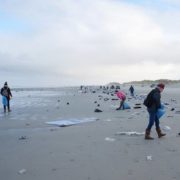What’s the deal with the Plastic Soup again?
March 15 2024 That’s what readers of news site nu.nl on their comment platform Nujij were wondering. In a recent […]
Amsterdam, 10 January 2018 – You do not see them, but the fibres from synthetic clothing are everywhere. They are in the water and float in the air. We breathe them in and they flutter down to the ground. A diptych in De Groene Amsterdammer last year not only made it clear that an ecological disaster is in the making, but also that nothing is being done to address this disaster.
Two conclusions were drawn by the journalist in the articles that appeared on 24 October and 5 December. One, the fashion industry may pat itself on the back on the subject of sustainability, but it is as still as a mouse on plastic microfibres. The problem of microfibres is given absolutely no priority in the industry. Two, the Government is not intervening and is leaving the initiatives to the market. Last summer, Minister Stientje van Veldhoven (D66) wrote [LINK] to The House of Representatives that “In collaboration with the textile sector, I will first explore the innovative solutions that they see that will prevent fibres from entering the water and will make further agreements about it”. In this case, she referred to the Platform Circulair Textiel (circular textile platform). The objective of this platform, which is made up of textile companies, is to further the circular economy in the clothing and textile sector. To this end, it published the Roadmap Circulair Textiel (in Dutch). Has the sector already thought about addressing the release of plastic microfibres when synthetic textiles are washed and dried? An estimated average of nine million fibres are lost in every five kilos of polyester washed, research published in the scientific journal Environmental Pollution showed at the end of 2017. Despite the increasing amount of scientific research that point to the problems of plastic microfibres, the Platform Circulair Textiel is completely ignoring this environmental problem. In contrast, making thread from PET bottles is presented in the Roadmap as a positive example of circular design. As if textiles made of PET bottles have no undesirable loss of fibres.
The chance that the textile sector itself comes up with solutions, which the Minister would like, seems minimal. This is confirmed by a small-scale investigation commissioned by the Plastic Soup Foundation and done by students of the University of Amsterdam last autumn.
The sustainability managers of nine randomly chosen companies in the textile sector were interviewed. The interviews revolved around two core questions: “What do companies in the textile sector know about plastic microfibres?” and “Are the companies open for solutions?”
The first striking finding was that there is a major lack of knowledge. Of the companies interviewed, one third did not know about the problem of plastic microfibres. And that it is a great problem was not accepted “because customers never ask about it”. The companies also do not believe that the sector could be self-regulating. The only thing that would help is if the government passes regulations to which all the companies must adhere. The students also observed that there are no commercial stimuli for companies to solve the problem. The students aptly called their research Plastic microvezels. De Achilleshiel van de Circulaire Economie (plastic microfibres: the Achilles heel of the circular economy).
Maria Westerbos, Director of the Plastic Soup Foundation: “Government and textile companies point at each other, and mostly turn away from this problem. This has to change fast. We started the Ocean Clean Wash campaign a few years ago and invite textile companies throughout the chain to join. At the beginning of February, we will make known new test results on questions such as the number of fibres some large brands’ clothing loses. We will also make some solutions widely known. I would like to see the Minister now to discuss these pioneering innovations.”
Also read – Waste2Wear hides the real problem: microfibres.
March 15 2024 That’s what readers of news site nu.nl on their comment platform Nujij were wondering. In a recent […]
The first Impact Fair is Europe’s largest Impact Experience. An interactive ‘immersive’ experience of impactful examples.
The waste-export to countries outside of the EU has been restricted The Netherlands is against a carpet ban on shipping of plastic waste.
The waste-export to countries outside of the EU has been restricted The Netherlands is against a carpet ban on shipping of plastic waste.

 Large donation by C&A Foundation for new educational materials on plastic...
Large donation by C&A Foundation for new educational materials on plastic...